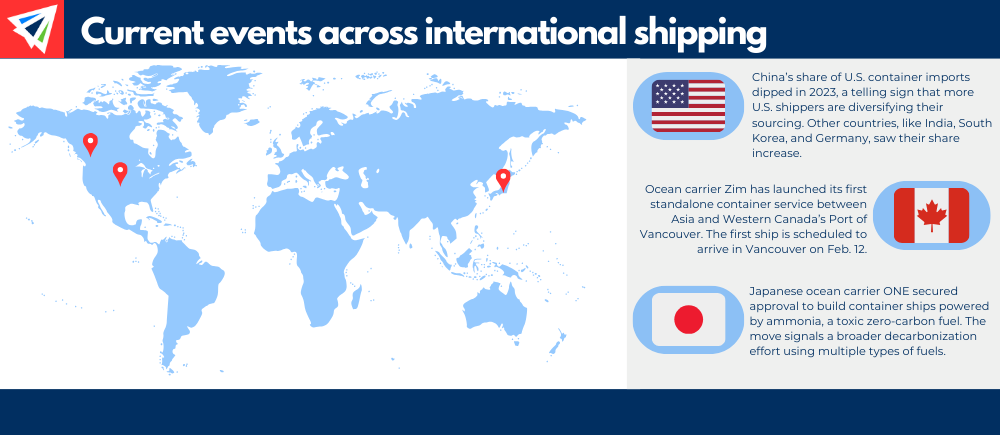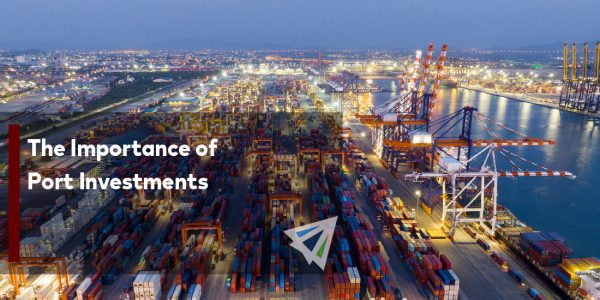Competitive Edge
January 31st, 2024
Stay Current with InterlogUSA
Latest Industry Happenings and Market Updates:

IMPORT: Asia to North America (TPEB)
Recent Developments:
- Major carriers are issuing another round of general rate increases (GRIs) effective tomorrow, Feb. 1. These increases are in play for Asia services to all U.S. coasts.
- Surcharges remain imposed on transits through the drought-hit Panama Canal.
- Carrier services remain transiting around Africa to avoid the Suez Canal. Transit times and rates have increased, while more capacity is being absorbed due to service requirements.
Rates: Rates have nearly doubled since late December. Longer transits (avoiding the Suez) will increase shipping demand measured in ton-miles (volume multiplied by distance), a factor further applying upward pressure on rates.
Space: Space has tightened due to external supply chain events and pre-Chinese New Year preparations.
Capacity: Longer transits averting the canals will absorb vessel capacity in order to maintain weekly services.
Equipment: There are no outstanding equipment deficits or bottlenecks.
TIPS:
- Chinese New Year begins Feb. 10 with related disruptions beginning days, if not a week, sooner. Establish a firm timeline for import activity as well as a vetted pool of multiple logistics providers. Do you need your freight out of China before the holiday or can you wait after?
- Hold your logistics partners accountable for frequent updates regarding current market conditions and routing impacts.
- Be flexible and adaptive to alternative service options, especially as it relates to potential savings on cost or transit.
IMPORT: Europe to North America (TAWB)
Rates: Rates have fallen since early January. This development signals that demand remains far too low for carriers to sustainably lift prices.
Space: Space is open.
Capacity: Capacity remains in excess. Carriers are partially curbing this by reducing the size of vessels operating on transatlantic lanes. However, blank sailing activity remains minimal.
Equipment: Availability on both origin and destination sides, unless advised otherwise.
TIPS:
- Book at least three weeks prior to the ready date.
- Communicate with your logistics partners to ensure that you’re up to speed on the EU ETS program and its evolving impacts on transatlantic trade.
EXPORT: North America to Asia
Rates: Rates are low and level.
Capacity: Space remains open, particularly from West Coast ports, however carriers remain curbing capacity via blank sailings and slow steaming as U.S. import demand remains challenged.
Equipment: Barge services in China will be temporarily suspended in early February due to this year’s Chinese New Year holiday.
TIPS:
- Insufficient communication with sailing schedules can lead to higher detention and demurrage fees as well as higher trucking and storage costs. Ensure your logistics partners are not keeping you and your cargo in the dark.
Freight News
Ocean Carriers Schedule Reliability in December
On the Asia-Europe trade lane in December, ocean carriers on-time performance dropped to levels that haven’t been seen since October 2022.
Schedule reliability on the Asia-North Europe trade lane in December fell 9.2 percentage points from November, per Sea-Intelligence Maritime Analysis data.
Some Ocean Carriers Adapting Services Due to Red Sea Challenges
MSC sent out a customer advisory last week saying, “rotations will be changed, and vessels will be added to limit the disruption on sailing schedules of the rerouting via the Cape [of Good Hope].”
MSC also noted that they will not be transmitting through the Suez Canal eastbound or westbound, until the “Red Sea passage is safe again.”
Maersk is also making some changes to services. They stated in an advisory to customers last Friday, that due to volatility around the Red Sea-Gulf of Aden, their Asia-U.S. East Coast service was going to be rerouted around the Cape of Good Hope.
“We are making these changes to preserve weekly departures for our services with the goal of offering more predictability, reliability, and consistency, despite the associated delays that come with the current reroutings,” Maersk said in a statement.
Watch January's Webinar!
TOPICS: The State of Global Trade
– Updates on the Red Sea/Suez Canal and the Panama Canal
– Rates/Capacity, routing options, and how all, or any, of this impacts you.
Sign Up For Our February Webinar!
Our next webinar is Wednesday, February 21st, at 10am CST!
We will be announcing topics in the next couple of weeks.
(Please note: If you do not see your webinar invite after you register, please make sure to check your junk/spam folders. Reach out if you have any questions at [email protected])
If you have any topic suggestions or questions for our experts.. let us know!
Interlog  Insights
Insights
Last week we recapped our January insights. If you want to view those you can do so, here.
This Friday at 10am CST our week one February insights will be going out to those who have subscribed. Click the button below to sign up.
Sign up for our
industry answers
Our team works to provide valuable, unique, and relevant content to assist you in finding solutions. Sign up now.

